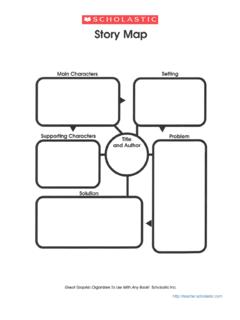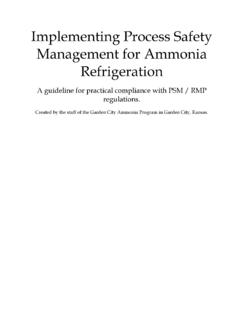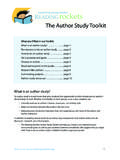Transcription of The Human Element - The Nautical Institute
1 The Human Element a guide to Human behaviour in the shipping industryDesigned and written byDik Gregory & Paul ShanahanMoral rightsThe rights of Dik Gregory and Paul Shanahan to be identified as the authors of this work have been asserted by them in accordance with the Copyright, Designs and Patents Act authors wish to thank Jane Edmonds, our editor, to whom we owe a debt of clarity and consistency, and to the many seafarers who provided us with context and insight. We also wish to thank Captain David Turner and Marc Williams of the MCA for their support and facilitation, and the valued contributions of Rick Roche (BP), Tommy Olofsen and Jo-Anne Watermeyer (Teekay), and Chris Spencer and Colin Legget (Standard P&I Club).
2 SponsorshipThis Guide was sponsored by the UK Maritime and Coastguard Agency, supported by BP Shipping, Teekay Marine Services, and the Standard P&I Stationery Office (TSO)PermissionsPhotographs are reproduced by kind permission of BP, Teekay Marine Services, the Marine Accident Investigation Branch (MAIB) and gs partnership ltd. The authors have made every effort to ensure that all necessary permissions have been obtained and attributions made for the technical materials used in this publication. In the event that we have missed something, please send email to We will put it right in the next edition. Crown Copyright 2010 Any publisher wishing to reproduce the content of this publication must not use or replicate any logo or replicate the official version s style and appearance, including the cover design, and must not present their version as being an official publication.
3 Neither MCA nor its partners accept any responsibility for the accuracy or comprehensiveness of any other Number9780115531200 First published April 2010 Second Impression July 2010 DedicationThe global shipping industry is a dangerous day, it loses two ships, pays out US$4 million in claims and radically changes the lives of hundreds of people for ever. Human behaviour is the source of virtually all such is also the reason why the loss is not book is dedicated to the professionalism of seafarers everywhere, and to the growing number of seafaring organisations who want to know how to guide Human behaviour in a safer and more profitable direction. The Human Element a guide to Human behaviour in the shipping industryForewordWe ve heard many views on the Human Element in the marine industry.
4 The only thing that exceeds our use of the expression is our overall lack of understanding of it. I sat an examination on Human factors for my private pilot s licence. It was a revelation, saving me from potentially fatal consequences on at least one occasion. I believe this book will go a long way to filling the knowledge gap in the shipping industry. It will not only help us run safer ships but more efficient ones as well. It should help convert the common belief that our officers and crews are our greatest hazard to the more accurate view that they are really our greatest asset. I hope a well-thumbed copy will sit on the shelf of every ship and shipping office next to the Code of Safe Working Practice for Merchant Seamen.
5 I am proud that we have been associated with this book s Shaw Vice President, Safety, Health, Marine & Engineering BP ShippingThe safety of our seafarers and environment, and the way we learn, have been long-held passions of mine, so it is a source of great pride that Teekay Shipping has supported the MCA with this industry guide to Human an industry we need to start considering how decisions impact our seafarers. We need to consistently remember the past, both good and bad, and apply the lessons learned. This Guide helps us explore the way we learn, the way we work, the way we make decisions and the way we view risks. In essence, it is a frame of reference for how to manage our people. The Guide reveals the complex challenges associated with Human behaviour.
6 Insight into these will assist in maximising the skills of the many talented people in our determine our industry s success the first step starts with each one of Graham Westgarth President Teekay Marine ServicesMy experience as a Master at sea, and over 20 years ashore in ship management and ship operations, has made it clear to me that the major issue affecting the shipping industry today is the Human technical issues have in the main been ironed out and the regulatory regime tightened up but incidents and claims continue to types of claim we see at the Standard Club keep recurring, and inevitably these are rooted in the more unfortunate consequences of Human book has the power to assist those people operating, managing and crewing the ships to address this major issue.
7 I very much hope they seize the opportunities it Chris Spencer Director of Loss Prevention Standard P&I ClubShipping is a truly global industry through which international trade and much of the world economy flows. Some ships are the biggest self-propelled machines on the face of the earth. Yet ships and trade do not depend on vast machines but on the people who run advances in the safety of seafarers and shipping are only possible through international cooperation, with national action on agreed standards. Securing maritime safety on behalf of the UK Government is our business at the Maritime and Coastguard Agency, the MCA. We know standards and inspections alone will not create a flourishing safety culture.
8 We also need understanding of the source of safety Human Guide offers an innovative and clear explanation of Human behaviour across the maritime industry. It brings together a wealth of insight and good practice to help you run safer, more successful Cardy Chief Executive Maritime and Coastguard AgencyHuman Element Guide page iAbout this GuideWho is this Guide for?This Guide is aimed at: Masters and crews Owners and managers Designers and buyers Regulators and investigatorsWhat does it offer?This Guide explains fundamental aspects of Human behaviour, which together constitute what the commercial maritime sector calls the Human Element . It makes clear that the Human Element is neither peripheral nor optional in the pursuit of a profitable and safe shipping industry.
9 On the contrary, the capabilities and vulnerabilities of Human beings are and always will be at the centre of the Guide clearly shows that managing the Human Element must take place simultaneously at all levels of the industry from within the engine rooms and decks of the smallest cargo ships to the conventions of the regulation makers and the boardrooms of the business strategists. It is the policies and strategies that shape and constrain the space in which ships and their crews Guide offers insight, explanation and advice to help manage the Human Element more was it developed?Analysis of shipping disasters in recent years has produced an increasing awareness of the central importance of the Human Element .
10 The loss of life, the impact on company profits and credibility, and the vast environmental damage that can result from the loss of a vessel remain clear and present recent initiatives have documented aspects of the Human Element , most notably ALERT!, a series of publications by Lloyds Register and the Nautical Institute . These are excellent resources that have been very successful in raising awareness about the importance of the Human Element . Because of these materials it is now widely understood that Human issues are involved in almost all marine incidents. At the same time, the frequency of marine incidents continues unabated. It is not enough, it seems, to simply know that Human issues are important.







